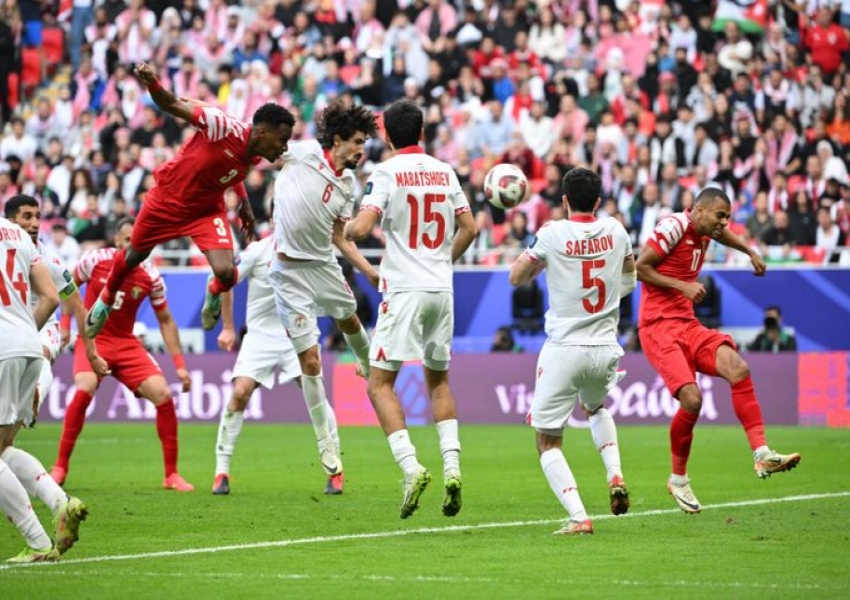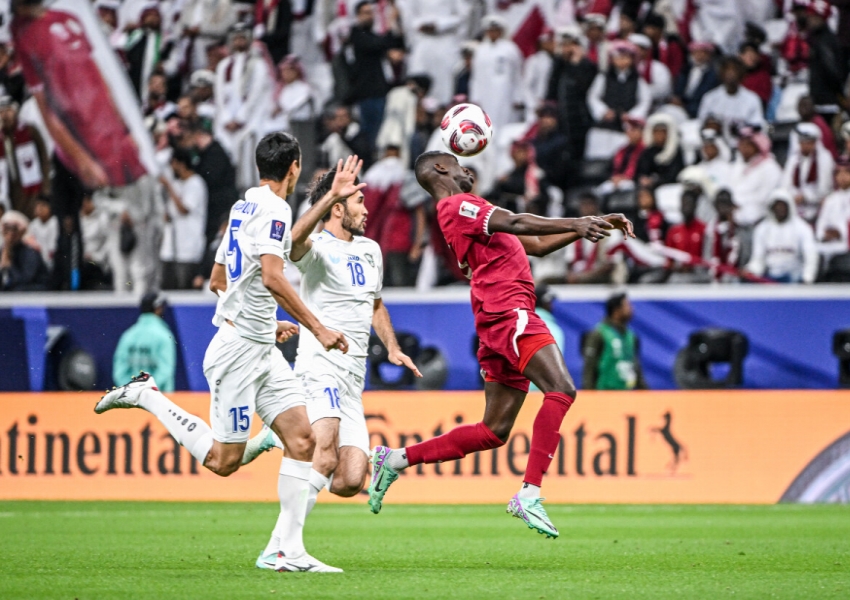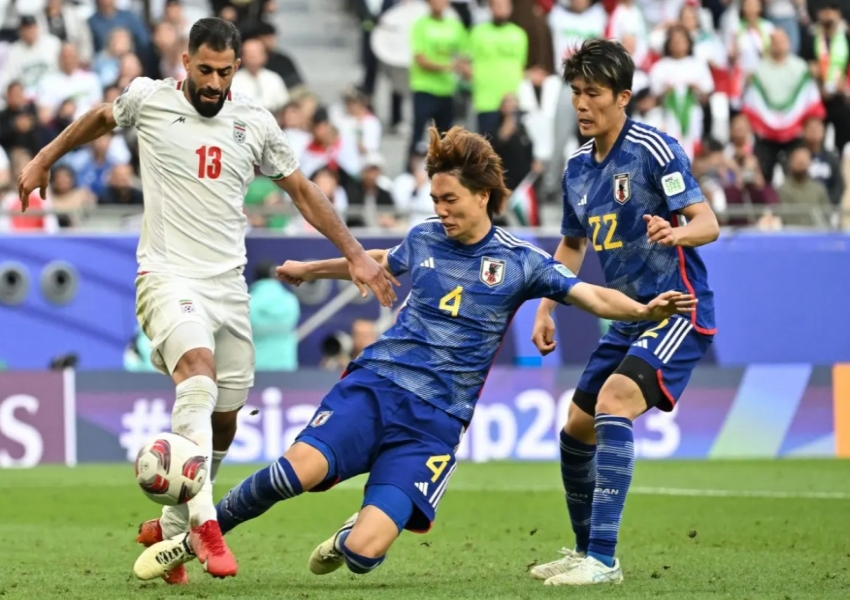AFC Asian Cup Semifinals: Korea's Strength vs. Luck, Qatar's Hidden Potential?
The AFC Asian Cup semifinals kicked off on the evening of February 6th with the "Taeguk Warriors" of South Korea showcasing their remarkable ability to dominate matches even when falling behind in their previous knockout games. Despite their tough luck, they managed to overturn deficits and secure victories, highlighting their resilience and strong gameplay. However, the question remains: will they continue to overcome adversity in the semifinals? Meanwhile, the hosts and defending champions, Qatar, have reached the semifinals smoothly but have yet to display their full potential. Is this deliberate? Are they holding back their true capabilities for the decisive moments?

Jordan vs. South Korea: How Much Gas Do the Taeguk Warriors Have Left?
The quarterfinal clash between Jordan and Tajikistan was relatively low-profile compared to the other matchups. Jordan's best previous performance was reaching the quarterfinals, while Tajikistan was making its debut in the tournament. Regardless of the winner, history was going to be made. Tajikistan's players, known for their speed and technical skills, matched Jordan in these areas, unlike Jordan’s previous match against Iraq where they had clear advantages. Finding their counterattacks ineffective, Jordan relied on their physical strength and aerial prowess, scoring the decisive goal from a corner.

Tajikistan couldn't mount a significant counterattack, their technical finesse neutralized by Jordan’s robust defense. The match ended 1-0 in favor of Jordan, a fair result given the dynamics on the field.

South Korea’s journey to the semifinals has been grueling. Their round of 16 and quarterfinal opponents were both teams that represented Asia in the last World Cup, naturally tough adversaries. Despite dominating both matches, Korea found themselves trailing each time and had to claw back into the game. Both times, they equalized in stoppage time, a testament to their endurance and fighting spirit. The players, especially the goalkeeper Jo Hyeon-woo, faced significant physical challenges but remained resilient. In their match against Australia, even center-back Kim Min-jae pushed up into the opponent's 30-meter area, demonstrating Korea's aggressive approach when trailing.
Jordan poses a different challenge. Their counterattacking prowess could dismantle any defense, as seen in the group stage when they troubled Korea. If Korea were fully fit, they could easily overpower Jordan, but fatigue from back-to-back 120-minute matches might level the playing field. The match could end 1-1 in regular time, with Jordan potentially securing a 3-1 victory in extra time.
Qatar vs. Iran: The Defending Champions’ True Strength?
Qatar, the hosts and defending champions, faced their first real test in the quarterfinals against Uzbekistan. The visitors' intricate play and high-pressing style resembled that of top European teams. Qatar, benefiting from home advantage and a bit of luck, took the lead in the 27th minute through an own goal. Uzbekistan dominated possession, and an equalizer seemed inevitable. Qatar’s goalkeeper Barsham received a yellow card early in the second half, indicating the pressure they were under. Despite this, Qatar held firm, taking the match to a penalty shootout where Barsham's heroics kept their title defense alive.
Iran, physically dominant in Asia, rarely exploited this advantage against Japan. In the previous Asian Cup semifinals, Japan defeated Iran 3-0, but this time, Japan’s abandonment of their traditional passing game left them vulnerable. European-based Japanese players appeared fatigued and disoriented, with key players like Itakura Ko sending costly mistakes and Mitoma Kaoru unfit to start. This allowed Iran to maximize their physical superiority.
Historically, Iran has dominated their encounters with Qatar, but they haven't met in an official match since the 2022 World Cup cycle began. Ali, the top scorer of the last Asian Cup, has only scored once in this tournament so far, but he might find his form in this semifinal. Qatar, leveraging their home advantage, could edge out a 2-1 victory over Iran to advance to the final.
A Closer Look at South Korea’s Semifinal Prospects
South Korea’s journey to the semifinals has been anything but smooth. Their matches against teams with World Cup pedigree, like Australia and Iraq, have tested their mettle. In both games, Korea had to come from behind, showcasing their resilience and tactical prowess. Coach Paulo Bento's ability to make crucial substitutions and tactical adjustments has been pivotal. Despite trailing in both knockout games, Korea’s second-half performances were markedly superior, often pinning their opponents back and creating numerous scoring opportunities.
The standout performer for Korea has been their goalkeeper, Jo Hyeon-woo. His composure and timely saves have kept Korea in contention. Meanwhile, the defensive line, marshaled by Kim Min-jae, has shown remarkable versatility, pushing forward to support the attack when necessary. This aggressive approach has been risky but rewarding, as seen in their late comebacks.
Jordan’s Tactical Approach
Jordan's progression to the semifinals is a testament to their tactical flexibility and physical prowess. Their quarterfinal match against Tajikistan highlighted their ability to adapt. Unable to leverage their speed and technical skills against a similarly adept team, they shifted focus to physical dominance and set-piece efficiency. This pragmatic approach paid off, securing them a place in the semifinals.
Against Korea, Jordan’s strategy will likely revolve around their counterattacking strength. Korea’s aggressive play and high defensive line could leave them vulnerable to quick transitions, a scenario Jordan is well-equipped to exploit. Fatigue will be a significant factor for Korea, potentially giving Jordan the edge in a physically demanding match.
Qatar’s Silent Strength
Qatar's campaign has been characterized by efficient, if not spectacular, performances. Their match against Uzbekistan was a prime example of their ability to grind out results. Despite facing considerable pressure, Qatar's defensive organization and goalkeeper Barsham's heroics in the penalty shootout secured their passage to the semifinals.
Qatar’s squad depth and tactical discipline have been crucial. They have managed their resources well, often appearing to hold back their full potential, possibly to peak at the crucial knockout stages. This strategic conservation of energy and form could be pivotal against a physically imposing Iran.
Iran’s Physical Dominance
Iran’s physical superiority has been a cornerstone of their success in Asian football. Their ability to outmuscle and outlast opponents has been evident throughout the tournament. However, their reliance on physicality sometimes overshadows their technical and tactical capabilities. Against Japan, Iran capitalized on their opponents’ fatigue and disorganization, highlighting their opportunistic streak.
Against Qatar, Iran’s strategy will likely focus on leveraging their physical edge while nullifying Qatar’s home advantage. The battle in midfield, where Iran's physical presence could dominate, will be crucial. However, Qatar's tactical discipline and home support might offset Iran's physical dominance, making for a fascinating contest.
Conclusion
As the semifinals approach, the narratives surrounding South Korea and Qatar offer intriguing contrasts. South Korea's resilience and tactical adaptability have been tested to the limit, while Qatar’s strategic conservatism suggests a team ready to unleash its full potential at the right moment. Both teams face significant challenges: South Korea must overcome fatigue and Jordan's counterattacking threat, while Qatar must navigate Iran’s physicality and tactical acumen.
These semifinals promise to be a testament to the strategic depth and competitive spirit of Asian football, with each team bringing unique strengths and stories to the pitch. The outcomes will not only determine the finalists but also provide deeper insights into the evolving dynamics of football in Asia.
Copyright Statement:
Author: mrfootballer
Source: Mrfootballer
The copyright of this article belongs to the author. Reproduction is not allowed without permission.
Recommended Blog
- Inter Milan Dominates Serie A's Big 7: 9 Wins, 1 Draw, and a Mysterious Halftime Communication
- La Liga Round 24: Real Madrid’s Defensive Shuffles and Real Sociedad’s Scoreless Streak
- Inter Milan’s Departing Hero: Klaassen’s Pure Desire Demonstrates Great Qualities
- Bundesliga Round 21: Dortmund Brewing a Big Win, Leipzig Can't Afford to Overlook Real Madrid
- Celebrating the Lunar New Year with Inter Milan's Trio of Joyous News: Post-Moratti Era Breakthroughs and Steering Away from Juventus
- Inter Milan's Crucial Visit to Madrid: Key Negotiations and Scouting Opportunities
- Emphasizing Speed: The Tactical Similarities and Differences Between Jordan and Qatar, and the Future of Asian Football
- Inter Milan Faces a Three-Year Weakness: Can Simone Inzaghi’s Preferences Solve the 4.5th Striker Problem?
- FA Cup Fourth Round Replays: Chelsea’s Confidence Shattered, Forest’s Overemphasis on the Cup
- Inter Milan’s Key Figure Delivers Thought-Provoking Claim: Why Having Less Transfer Budget Can Be Better; Reflections on Ronaldo and Bellingham
Hot Blog
- English Media: Manchester United Will Win Premier League Title in 2028! History Will Repeat Itself, Two Teams Serve as Inspirations
- 0-2 Double Defeat! China National Team Stuck at 6 Points: No More Direct World Cup Hopes, Two Crucial Matches Ahead
- 4 AM Showdown: Barcelona's Revenge Match! Win = 3-Point Lead Over Real Madrid, Key Players Rested
- China National Football Team Drops 13.6 Points, Slips to 94th in FIFA Rankings: Syria Overtakes, New 9-Year Low
- 0-0 Draw! Japan 12 Shots, 2 Missed One-on-Ones: 8 Matches, 20 Points, Group Winner, Saudi Arabia Stuck at 10 Points in 3rd
- 4-1, Double Win Over Brazil! Argentina Celebrates: World Cup Qualification Secured, 4th Team Globally to Qualify
- Real Madrid Got Lazy: 7 Kilometers Less Running in UCL! Two Superstar Spectators While Barça Outruns Them All
- United Go for Glory: Unbeaten in 10, Fueled by Kobbie Mainoo’s Return, Red Devils Eye Europa League Crown
- Champions League Classic: Barça’s Midfield Maestro Worshipped by Thousands After 11.5KM Marathon
- Champions League Semifinal Odds: Barça at 99%, Real Madrid’s Hopes Dwindle to 6%, PSG Cruise Ahead